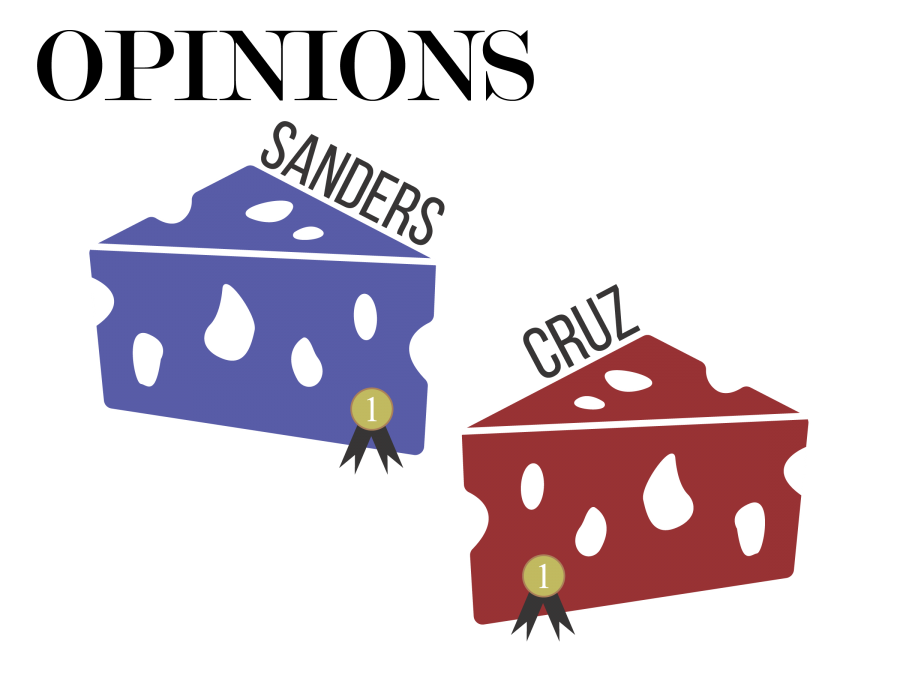All bets are off after Wisconsin primaries
April 7, 2016
April 5 was a day for the insurgents, as Republican presidential candidate Ted Cruz and Democratic presidential candidate Bernie Sanders each won their respective elections in landslide fashion. Cruz secured 48.2 percent of the Republican vote, followed by front-runner Donald Trump with 35.1 percent, and John Kasich with 14.1 percent. Sanders won 56.6 percent of the Democratic vote to Hillary Clinton’s 43.1 percent. So what does this mean moving forward? Let’s start with the Republicans.
For weeks, the Cruz campaign had Wisconsin circled in bright red sharpie on the primary calendar as the preeminent turning point of the race. And as Cruz stepped onto the podium in Milwaukee to claim victory in the Badger State, he reasserted that message less than 30 seconds into his speech: “Tonight is a turning point. It is a rallying cry.” I never thought I’d say this, but Cruz might be right. His win in Wisconsin could be the harbinger that punctures the invincibility of a Trump nomination. Once thought the inevitable GOP nominee, Trump is looking more and more vulnerable as his campaign tailspins into disarray. The blowout win compounds a miserable 10 days for Trump. He made incendiary comments concerning punishments for women that have abortions, levied pejorative attacks at Cruz’s wife on Twitter, and his campaign manager, Corey Lewandowski, was charged with simple battery after grabbing a female reporter. The embarrassing loss in Wisconsin makes Trump’s climb to the 1,237 delegates needed to win the Republican nomination considerably steeper. If neither Trump nor Cruz has 1,237 delegates before the end of the primary season, there will be a contested convention whereby pledged delegates are released and allowed to choose any candidate of their choosing at the Republican National Convention in July. The Cruz campaign has been predicting this outcome for months and has already begun lobbying delegates to vote for him.
While Wisconsin was friendly territory for Cruz, as it is home to many highly informed and engaged conservative Republicans, the upcoming stretch of states is anything but. With 16 states remaining on the schedule, Trump is ahead in delegate-rich states like New York, Pennsylvania, and California. However, NBC News reports that Trump must win 58 percent of the remaining delegates to send him over the 1,237 delegate threshold. If he falls short of the necessary delegates, a growing majority of party insiders believe the nomination will go to Cruz. Trump’s campaign does not have the political acumen to navigate a contested convention the way Cruz’s does. If Trump is not elected on the first ballot, the odds are in Cruz’s favor.
As for the Democratic race, the recent primary and caucus outcomes have given Clinton reason to heed the “Bern Notice.” Sanders’ win in Wisconsin marks his sixth win in the last seven state contests. Since the Democrats award delegates proportionally, the win in Wisconsin does not make a considerable dent in what many consider Clinton’s insurmountable lead of pledged and superdelegates. While the delegate math overwhelmingly points to a Clinton nomination, there is still time for Sanders to obstruct Clinton’s path to the 2,382 delegates she needs to win the nomination outright, thus forcing a contested convention at the Democratic National Convention in Philadelphia. Sanders’ recent hot streak, sparked by landslides out West and headlined by Tuesday’s statement win in Wisconsin, has him gathering momentum at a critical moment.
The Democrats move to Wyoming for the state’s caucus on April 9, where Sanders is the favorite to win again, before moving to what could be the most pivotal moment in the race so far: New York. Sanders is a Brooklyn native, and Clinton served in the U.S. Senate in New York for eight years. An upset here would be a coup for Sanders and a nightmare for Clinton. It would turn the Democratic race on its head, as Cruz’s win in Wisconsin seems to have done for the Republican race. Break out your popcorn, folks: Wisconsin just made both races a whole lot more interesting.




















